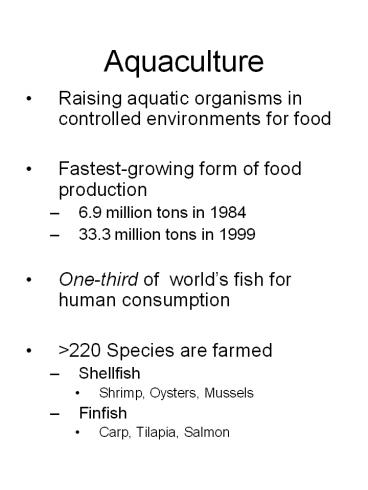Aquaculture - PowerPoint PPT Presentation
1 / 14
Title:
Aquaculture
Description:
Carp, Tilapia, Salmon. Forms of Aquaculture. Inland Ponds. Substantial habitat 'alteration' ... 1980's: Fishermen, Tribes and Environmentalists oppose salmon farming ... – PowerPoint PPT presentation
Number of Views:66
Avg rating:3.0/5.0
Title: Aquaculture
1
Aquaculture
- Raising aquatic organisms in controlled
environments for food - Fastest-growing form of food production
- 6.9 million tons in 1984
- 33.3 million tons in 1999
- One-third of worlds fish for human consumption
- gt220 Species are farmed
- Shellfish
- Shrimp, Oysters, Mussels
- Finfish
- Carp, Tilapia, Salmon
2
Forms of Aquaculture
- Inland Ponds
- Substantial habitat alteration
- Easy to manage waste
- Coastal Net Cages
- Less habitat alteration
- Difficult to manage waste
3
Inland Ponds
Ecuadorian Shrimp Farms
Pro -Easy to manage Con -Substantial habitat
alteration
4
Net Cages
British Columbia Salmon Farm
Pro -Less habitat alteration Con -Difficult
to manage
5
History of B.C. Salmon Farming
- 1970s Small operations bought by multinational
corporations - 1980s Fishermen, Tribes and Environmentalists
oppose salmon farming - 1995 B.C. imposes moratorium
- 2004 Farmed salmon found to have higher PCB than
wild salmon
6
Columbia River Chinook (millions of kg) (from
Beiningen, KT. 1976. Oregon D.F. W.)
Why farm salmon?
7
State of Pacific Northwest Salmon Runs
8
Thirty-six PNW salmon runs listed under E.S.A.
- Causes
- Destruction of spawning habitat
- Logging
- Dams
- No access to spawning habitat
- Overfishing
- Reduces returning salmon
9
Salmon Farming Problems
- Contamination
- Increases disease
- Produces lots of waste
- Ecologically inefficient
- 5 kg wild fish 1 kg farmed salmon
- Escaped farmed fish affect wild stocks
- Spread disease
- Reduce viability
- Farmed fish are more polluted than wild (Science
Jan. 2004) - Biomagnification of pollutants
10
Science January 9, 2004
- differences between the farmed and wild salmon
contaminant concentrations are most likely a
function of their diet. - (Hites et al., 2004)
11
Is aquaculture bad?
- Noif done ecologically
- Scale is important
- Small Scale More Environmental
- Herbivores better than carnivores
- Herbivores are more efficient
- Filter feeders actually clean the water
- Integrates with other agriculture
- Chinese Integrated aquaculture
12
(No Transcript)
13
Benefits of Aquaculture
- Improves food security
- Reliable protein source
- 30 of world is malnourished
- Can be very energy efficient
- 10x more fish per unit area than ocean
- Reduces pressure on wild fish
- 70 of edible ocean fish are declining
- Reduces by-catch
14
What you can do
- Support with your
- Buy
- Well managed, wild-caught salmon
- Copper River Salmon is good
- Farmed herbivorous Fish
- Farmed filter feeders
- Dont Buy
- Farmed salmon
- Farmed shrimp
- Resources
- www.mbayaq.org/cr/seafoodwatch.asp































